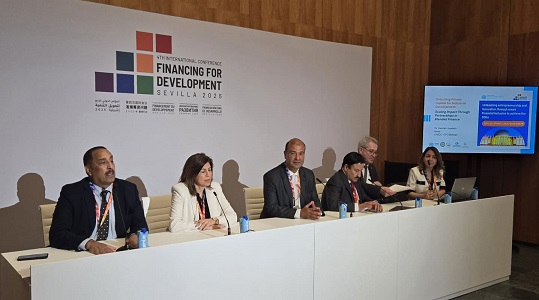Dr. Khaled Hanafy, Secretary General of the Union of Arab Chambers, emphasized during a high-level session titled “Unleashing Entrepreneurship and Innovation through Smart Financial Inclusion to Achieve the Sustainable Development Goals”, held as part of the Fourth International Conference on Financing for Development (FFD4) on July 3, 2025, in Seville, Spain — with the participation of Mr. Gunter Pauli, Director General of the United Nations Industrial Development Organization (UNIDO); Mr. Hashim Hussein, Head of the UNIDO Investment and Technology Promotion Office in Bahrain; His Excellency Sheikh Ibrahim Al Khalifa, Chairman of the Board of Trustees of the International Entrepreneurship Center; and Wissam Fattouh, Secretary General of the Union of Arab Banks, along with global leaders including heads of state, prime ministers, ministers, government officials, international and regional organizations, financial institutions, companies, and civil society organizations — that, "The world is facing unprecedented financing gaps estimated at around $4.2 trillion annually to achieve the Sustainable Development Goals (SDGs) by 2030. However, the solution does not lie solely in aid or traditional funding, but rather in mobilizing ecosystems that unleash the talents, ambitions, and creativity of entrepreneurs — especially youth and women — through smarter, more integrated, and tech-enabled financial tools.”
Dr. Hanafy explained that “the Union of Arab Chambers plays a pivotal role in activating the private sector as a partner in the development financing agenda, serving as a strategic bridge between governments, investors, and businesses. In this context, the Union contributes to boosting regional investment flows by encouraging the creation of joint investment platforms that attract capital from Arab sovereign wealth funds, development banks, and high-net-worth individuals. These platforms support projects aligned with national development strategies, including infrastructure, renewable energy, and agribusiness sectors. The Union also works with Arab governments to advocate for regulatory reforms that reduce investment risks — particularly reforms related to property rights, taxation, cross-border trade, and dispute resolution — which are crucial to unlocking long-term private capital. According to the 2024 Arab Sustainable Development Goals Financing Report by the United Nations Economic and Social Commission for Western Asia (ESCWA), improving the investment climate could significantly reduce the regional financing gap, which is currently estimated at $570 billion annually.”
Dr. Hanafy also pointed out that “the Union supports public-private partnership frameworks that channel private capital toward public infrastructure and social development projects. These partnerships are vital for sectors such as energy transition, logistics, healthcare, and education, all of which are fundamental to achieving the SDGs. In parallel, the Union backs fintech and digital investment platforms that enhance access to finance and connect investors with high-impact projects, especially in underserved markets.”
He stressed that “governments in the Arab region have a tremendous opportunity to unleash entrepreneurship and innovation as engines for sustainable growth. To realize this, inclusive national ecosystems must be developed to empower entrepreneurs. Key enablers include streamlining business registration, licensing, and tax processes. Countries that have implemented "one-stop-shop" models and e-government portals have witnessed substantial reductions in the time and cost of starting businesses. Governments should also expand access to sustainable capital through the scaling of credit guarantee programs to reduce lending risks for SMEs, while supporting the growth of impact investing, venture capital, and Islamic finance instruments. Additionally, there is a need to foster the development of fintech platforms and crowdfunding models. According to the International Finance Corporation (IFC), only 8% of SMEs in the MENA region have access to formal loans, while only 6% of women-owned businesses receive formal credit, compared to 11% of men-owned businesses. Moreover, just 18% of Arab SMEs participate in cross-border trade, a constraint on their growth and expansion. This highlights the urgent need for inclusive financing. Furthermore, entrepreneurship and digital skills must be integrated into national education systems, and technical and vocational training programs should be expanded.”
Dr. Hanafy emphasized that “small businesses and entrepreneurs need to scale, and for that to happen, governments must remove non-tariff barriers, harmonize regulations, and broaden access to regional e-commerce platforms and digital payment systems. He also called for cross-border entrepreneurship and youth-led export services to be stimulated by simplifying customs processes and expanding digital trade platforms.”
He concluded by stating, “If we are serious about achieving the Sustainable Development Goals, then we must be equally serious about empowering entrepreneurs to become agents of change. But this cannot be achieved by any single institution alone. It requires a shared development financing agenda involving governments, the private sector, development institutions, and civil society. Entrepreneurship is not a gap to be filled, but a force to be unleashed. Financial inclusion is not about charity — it's about dignity, access, and fairness. Innovation is not the end goal — it is a pathway to a more just, dynamic, and sustainable future. What is required is a shared commitment — to turn ambition into action, and to ensure that innovation and entrepreneurship become real drivers of opportunity for all.”
Source: (Union of Arab Chambers)

